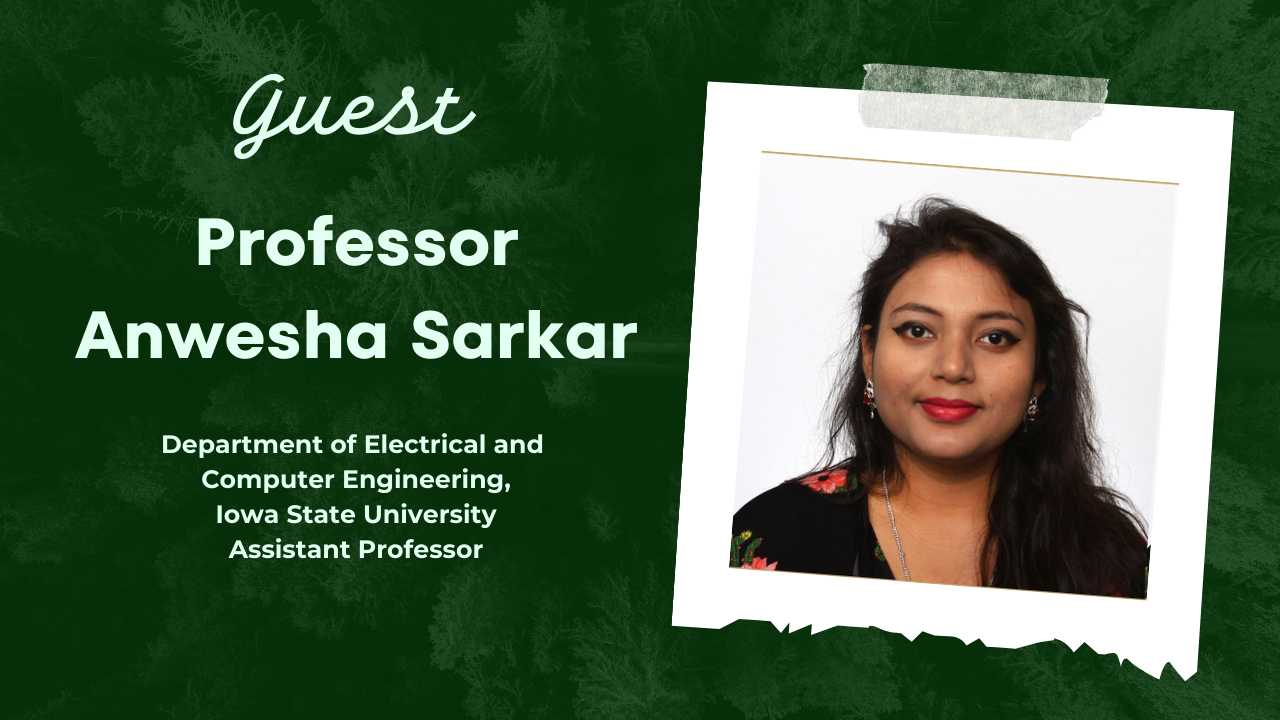Dr. Anwesha Sarkar
Unwavering Perseverance: The Inspiring Journey of Professor Anwesha Sarkar in STEM
Professor Anwesha Sarkar is a physicist whose STEM journey was inspired by her mother, a math teacher. Raised in India, Anwesha pursued physics, earning degrees from St. Xavier’s College, IIT Madras, and Wayne State University. Despite male-dominated environments, she excelled, delving into bioengineering collaborations and embracing physics-biology intersections.
Throughout her academic journey, Professor Anwesha thrived in institutions where the male-to-female student ratio was heavily skewed, showcasing her natural aptitude for physics. She solidified her decision to focus on physics by exploring bioengineering and biophysics collaborations, revealing exciting intersections between physics and biology.
Professor Anwesha’s passion for physics extends beyond her research. As a mentor, she nurtures young minds and fosters a love for science among her students. Her commitment to uplifting others echoes the impact her mother had on her own journey, highlighting the profound influence of supportive role models.
In her advice to new Asian female students entering STEM, Professor Anwesha Sarkar emphasizes the power of perseverance and unique qualities they possess. She encourages them to push through challenges, utilizing their strengths to forge ahead. Recognizing the importance of happiness in work, she highlights the significance of surrounding oneself with confident and supportive individuals.
Our support system chooses us. Make sure you have those kind of people, confident and happy in their own life. They will believe in you and what you want to do.
Professor Anwesha’s story inspires aspiring scientists, especially Asian women, to embrace their passion and create positive change in STEM. Her dedication to physics and passion for nurturing young minds showcase the transformative impact of supportive role models. Through her research, mentorship, and advocacy, Professor Sarkar inspires a new era of aspiring researchers to embrace their passion and create positive change in the world of science.
Professor Sarkar’s Profile:
Professor Anwesha Sarkar, an esteemed physicist whose journey in STEM was ignited by a powerful influence – her mother, a math teacher, and an inspiring figure who dedicated herself to helping struggling students. Growing up in India, Anwesha’s fascination with physics never waned, leading her to pursue a bachelor’s in Physics at St. Xavier’s College, Master’s in Physics at IIT Madras, M.Phil. in Physics at the Institute of Physics in India, and PhD in Physics at Wayne State University.
Education
- Ph.D. and Postdoctoral Research Associate, Iowa State University, 2020
- M.Phil. Physics, Wayne State University, 2015
- M.S. Institute of Physics, India, 2011
- B.S. Physics, IIT Madras, India, 2010
- Physics, ST. Xavier’s College, Kolkata, India, 2008
Publications
Sarkar, A., LeVine, D. N., Kuzmina, N., Zhao, Y., & Wang, X. (2020). Cell migration driven by self-generated integrin ligand gradient on ligand-labile surfaces. Current Biology, 30(20), 4022-4032. doi: https://doi.org/10.1016/j.cub.2020.08.020
Sarkar, A., LeVine, D., Zhao, Y., Mollaeian, K., Ren, J., & Wang, X. (2020). Tandem tension sensor reveals substrate rigidity-dependence of integrin molecular tensions in live cells. bioRxiv. doi: https://doi.org/10.1101/2020.01.24.918946
Zhao, Y., Sarkar, A., & Wang, X. (2020). Peptide nucleic acid based tension sensor for cellular force imaging with strong DNase resistance. Biosensors and Bioelectronics, 150, 111959. doi: https://doi.org/10.1016/j.bios.2019.111959
Wang, Y., Zhao, Y., Sarkar, A., & Wang, X. (2019). Optical sensor revealed abnormal nuclease spatial activity on cancer cell membrane. Journal of biophotonics, 12(5), e201800351. DOI: <10.1002/jbio.201800351>
Zhao, Y., Wang, Y., Sarkar, A., & Wang, X. (2018). Keratocytes generate high integrin tension at the trailing edge to mediate rear De-adhesion during rapid cell migration. Iscience, 9, 502-512. doi: https://doi.org/10.1016/j.isci.2018.11.016
For Further projects and research work, check out Professor Sarkar’s website: BACM LAB – Research Laboratory of Professor Anwesha Sarkar

